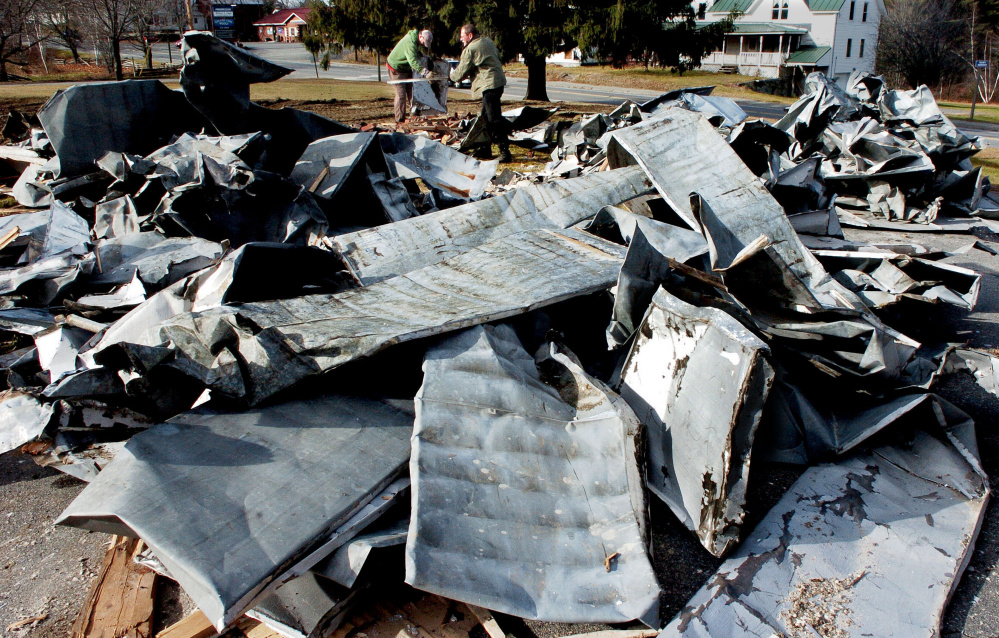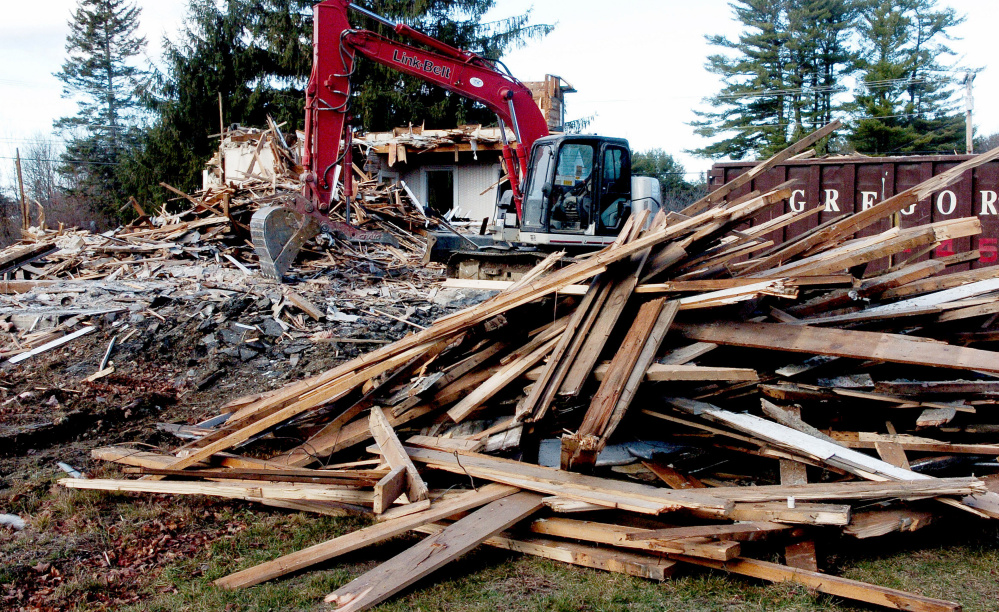SKOWHEGAN — The Rev. Richard Berry, pastor at Trinity Evangelical Free Church and founder of the men’s homeless shelter on McClellan Street, says he is going to leave plans for a new shelter for homeless families up to God.
Berry’s plans for a family shelter in a house he purchased on land next to the church in 2014 never materialized because he couldn’t bring the old farmhouse up to local codes. The two-story home at 84 Front St. in Skowhegan succumbed to the claws of a backhoe this month, but Berry said he isn’t done with his dream for a family shelter just yet.
Now, he said, there are plans in place to build a new 48-bed family shelter from the ground up, where the old house once stood.
“We believe God’s leading us to do it,” Berry said in a recent interview. “We’re going to dig a hole and see how God does this one. We’re excited about where it’s going, very excited.”
Berry closed on the purchase of the house and barn in February 2014 on land that abuts church property. The house was to be renovated to become a homeless shelter for families, which Berry wanted to open the same year.
The church paid $50,000 for the foreclosed home at 84 Front St., plus closing fees. Berry, 65, said he raised the money in six weeks through donations from his speaking engagements across New England.
But he ran into problems with the house and his plans to house families there.
Skowhegan Code Enforcement Officer Randy Gray said Berry could have used the house as a single family dwelling with possible office space, but not as a multi-family homeless shelter.
“They could have used it for a couple or a family. I had no issue with that whatsoever,” Gray said. “But when you start letting it out as a shelter, then the codes change. It could have needed an alarm system. It could have needed a sprinkler system. It’s hard to say because we never got to that point.”
Gray said the house was a residential structure and it had to stay that way. He added that Berry started doing some conversion work without contacting the codes office and that work did not meet the standards for a pre-existing home set forth in the 101 Life and Safety codes and the International Residential Code.
A new shelter will have to go through a site plan review and have the necessary building permits and would have to be reviewed by the Office of the State Fire Marshal, Gray said.
“To bring it to code, it would have cost me more than building a brand new one,” Berry said. “I’m not upset at all. We took it down and our plans are to break ground in the spring. We want to build a 48-bed family facility, brand new, up to codes, with a playground area for the kids, fenced in so they’ll be safe.”
He said a contractor donated equipment and manpower to tear the old house down. And a crew of Amish men dismantled the barn last summer.
The men’s shelter is licensed for men only – no women, no children. Berry said he wants to keep families together. The two-story farmhouse had four bedrooms upstairs and large rooms on the main floor. The barn was large and was to be converted to accommodate family living, Berry said.
He said once the renovations were complete, the new Trinity Family Shelter would house eight or nine families at a time.
Berry said the men’s shelter, which opened with 45 beds in 2008, expanded in 2011 and now accommodates 60 men. He said the shelter is at capacity.
Berry said it is important to have a place for families, given statistics showing record numbers of homeless in Maine.
A Point In Time survey conducted in January by the Maine State Housing Authority showed 1,192 people homeless in Maine. Of that number, 497 people were homeless in Portland with the remainder, 695 people, without a place to live in the rest of the state.
In 2016, Maine saw a 5 percent increase in the number of people who were homeless, according to the housing authority study. Also notable, the survey found, were the “dramatic swings” within homeless subpopulations. One with the highest increases in homelessness was families with children.
The Maine State Housing Authority last year released a survey of Maine’s homeless population, counting nearly 1,134 people who didn’t have a place to live one night in January 2015. Of that number, 472 were in Portland, while 662 were in the balance of the state.
Berry said the amount of money it is going to take to build a new shelter will depend on how donations of labor, materials, time and money come in for the project, as it did when the men’s shelter was built and expanded.
“If we didn’t get donations, it would cost us about a half-a-million dollars,” he said of the men’s shelter. “We ended up spending $145,000 to build it. All the rest came in donations. Everything depends on the donations.”
Send questions/comments to the editors.





Success. Please wait for the page to reload. If the page does not reload within 5 seconds, please refresh the page.
Enter your email and password to access comments.
Hi, to comment on stories you must . This profile is in addition to your subscription and website login.
Already have a commenting profile? .
Invalid username/password.
Please check your email to confirm and complete your registration.
Only subscribers are eligible to post comments. Please subscribe or login first for digital access. Here’s why.
Use the form below to reset your password. When you've submitted your account email, we will send an email with a reset code.